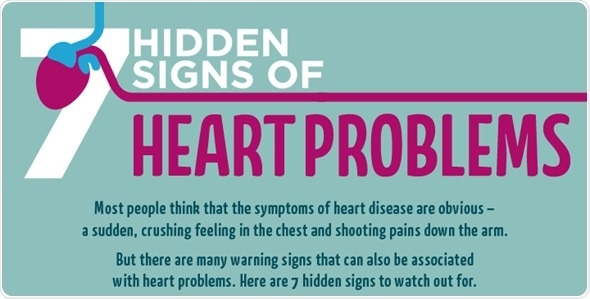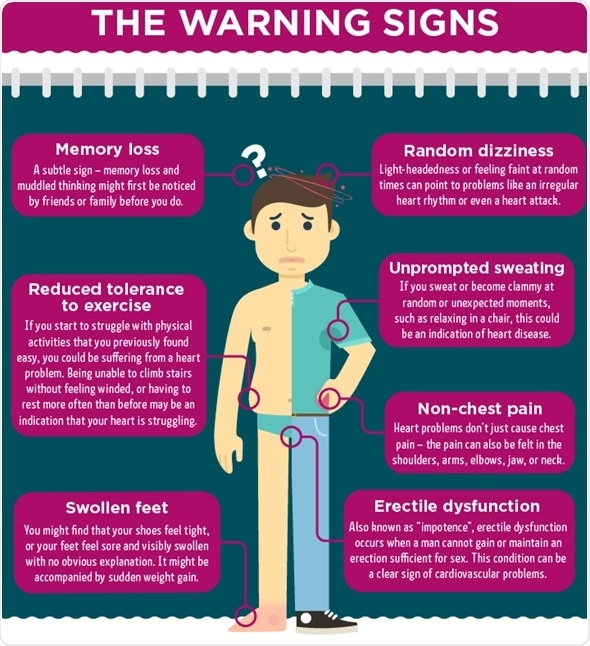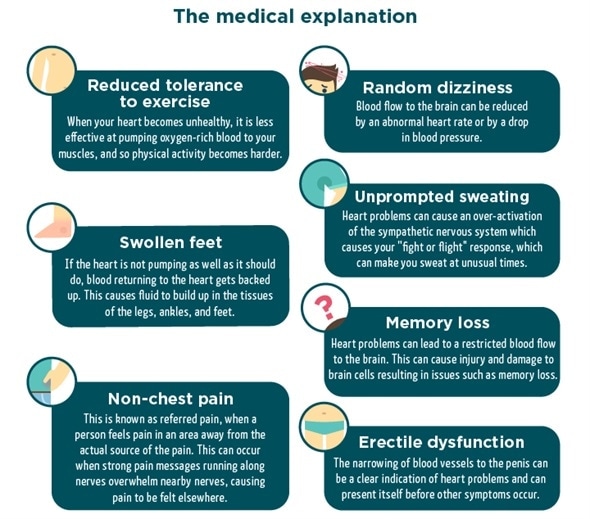By Dr Gigi Taguri
Since 1 in 4 deaths in the UK are related to a heart or circulatory disease, addressing heart health is a concern of national importance. Heart disease is the leading cause of death in men over 50, and an estimated 7 million of us are living with an undiagnosed risk factor – high blood pressure.
Put simply, everybody should know the state of their heart. The sudden onset of pain in the chest or down the arm is the most obvious sign of a heart problem, but many people are unaware that there are other signs you can watch out for.

© Creative Commons
Recognising some of the signs below could help identify a heart problem before it’s too late.
Hidden signs of heart problems

© Creative Commons
Swollen feet
A tightness in your shoes or visible swelling of your feet can indicate a heart problem. This can occur as a result of slowed circulation – as blood flows out of the heart at a slower rate, blood returning to the heart gets backed up. You may then witness a build-up in the tissues surrounding the feet, legs and ankles.
Erectile dysfunction
In men, erectile dysfunction (ED) can be a strong indicator of issues with your heart and circulatory system. It occurs when the tiny blood vessels feeding the penis don’t receive enough blood to maintain an erection sufficient for sex. ED can present itself far in advance of other symptoms, so it’s a good idea to watch out for it and act early.
Referred pain
Pain related to heart problems can occur in places other than the chest. You can experience ‘referred pain’, which occurs when pain messages running down nerves overwhelm nearby nerves. Referred pain linked to heart problems usually occurs in the shoulders, arms, jaw and neck.
Difficulty doing physical tasks
Struggling to execute simple physical tasks is a clear sign of a struggling circulatory system. You may find yourself short of breath when climbing the stairs, or feel a need to rest more often than in the past when exercising. This can indicate a reduction in your heart’s ability to supply your muscles with an oxygen-rich flow of blood.
Memory loss
Confusion and muddled thinking may indicate that your brain is not receiving a sufficient amount of blood. If left unaddressed, this can seriously damage your brain cells and lead to memory loss.

© Creative Commons
What to do if you see these signs
See your GP as soon as possible after spotting any of these problems. They may need to run tests to work out the cause of your symptoms.

© Creative Commons
However, don’t be too alarmed – many of these symptoms can be easily explained and may not be linked to your heart’s health. Some of these symptoms, such as erectile dysfunction, can also be treated in the short term until you work to improve your cardiovascular health.
As a long-term action, consider changing certain behaviours to lower your risk of developing a heart problem – I have listed some advice below.
How to reduce your risk of heart problems
Crucially, we do have the power to lower our risk of heart disease. Making a few adjustments to your lifestyle could do wonders for your heart, and reduce important risk factors like high blood pressure, high levels of LDL cholesterol, and obesity. I’ve collated the following advice, but you can also find more information in my article on heart health.

© Creative Commons
Exercise
Exercise is a great way of protecting yourself against heart disease. It works to lower your blood pressure, improve circulation and will increase your heart’s strength. Try and get some cardiovascular exercise, such as jogging, swimming or cycling 3-5 times each week.
Eat a balanced diet
Maintaining a healthy, balanced diet is essential to good heart health. In particular, reducing the consumption of foods high in saturated fats and sugars will help lower the level of ‘bad’ cholesterol in your blood and will protect you against developing type 2 diabetes. Reducing your intake of salty foods will also help protect against high blood pressure, which is a key risk factor for heart disease.
Lose weight
It’s also important to control the size of your portions. Continually taking in more energy than you expend can lead to weight gain, which puts an extra pressure on your heart. Visceral fat in particular, which collects around your waist line, increases your chances of developing heart disease. You may want to reduce your portion sizes as a result to try and lose some weight.
Further Reading
About Dr Gigi Taguri
Dr Taguri completed her medical training at the Royal Free and University College Medical School in 2005 and received an additional degree in Immunology. She worked in a number of hospitals in London before becoming a GP and is now a member of the Royal College of General Practitioners as well as a member of the Royal College of Physicians. Dr Taguri has a particular interest in sexual health and has gained a Diploma with the Faculty of Sexual and Reproductive Health. Her current professional responsibilities include working as a GP for the NHS.
Disclaimer: This article has not been subjected to peer review and is presented as the personal views of a qualified expert in the subject in accordance with the general terms and condition of use of the News-Medical.Net website.
Last Updated: Jun 25, 2019